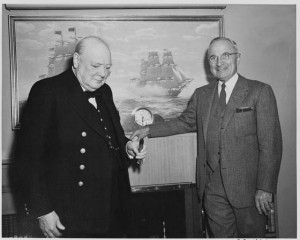Churchill on Trial: Washington, 1953

In early 1953, Winston Churchill was placed on trial by his peers, with President Truman the presiding judge, for complicity in the use of atomic bombs. To anyone who may write to say that he and Truman were making light of events causing thousands of deaths, the answer is twofold: 1) How do you know they were making light?; and 2) This is in answer to a historical query. Sources: Clark Clifford, recollection, to Richard Langworth, 1988. Margaret Truman, “After the Presidency,” in Life, 1 December 1972, 69-70. Also recorded in her book, Harry S. Truman.
__________________
Margaret Truman wrote: “During our last weeks in the White House, Prime Minister Churchill arrived for a visit. My father gave him a small stag dinner to which he invited Secretary of Defense Robert Lovett, Averell Harriman, General Omar Bradley, and Secretary of State Dean Acheson. Everyone was in an ebullient mood, especially Dad. Without warning, Mr. Churchill turned to him and said…”
Mr. President, I hope you have your answer ready for that hour when you and I stand before St. Peter and he says, “I understand you two are responsible for putting off those atomic bombs. What have you got to say for yourselves?”
Robert Lovett asked: “Are you sure, Prime Minister, that you are going to be in the same place as the President for that interrogation?
Lovett, my vast respect for the Creator of this universe and countless others gives me assurance that He would not condemn a man without a hearing.
Lovett: “True, but your hearing would not be likely to start in the Supreme Court, or, necessarily, in the same court as the President’s. It could be in another court far away.”
I don’t doubt that, but, wherever it is, it will be in accordance with the principles of English Common Law.
Dean Acheson, who liked to tweak Churchill about Britain’s diminished stature, then spoke up: “Is it altogether consistent with your respect for the Creator of this and other universes to limit His imagination and judicial procedure to the accomplishment of a minute island, in a tiny world, in one of the smaller of the universes?”
Well, there will be a trial by a jury of my peers, that’s certain.
Acheson: “Oyez! Oyez! In the matter of the immigration of Winston Spencer Churchill, Mr. Bailiff, will you empanel a jury?”
Each guest accepted an historic role, wrote Margaret Truman. “General Bradley decided he was Alexander the Great. Others played Julius Caesar, Socrates and Aristotle. The Prime Minister declined to permit Voltaire on his jury—he was an atheist—or Cromwell, because he did not believe in the rule of law. Then Mr. Acheson summoned George Washington. That was too much for Mr. Churchill. He saw that things were being stacked against him:”
I waive a jury, but not habeas corpus. You’ll not put me in any black hole.*
“They ignored him and completed the selection of the jury. Dad was appointed judge. The case was tried and the Prime Minister was acquitted.
“During this visit Mr. Churchill confessed to Dad that he had taken a dim view of him as President when he had succeeded Franklin Roosevelt. ‘I misjudged you badly,’ the Prime Minister said. ‘Since that time, you, more than any other man, have saved Western civilization.'”
_______
*Churchill’s words (bold face) are from Margaret Truman’s account except the last sentence asterisked, which was quoted to me by Clark Clifford, whose account was otherwise the same as Ms. Truman’s.







One thought on “Churchill on Trial: Washington, 1953”
This is a wonderful story; reminds me of the film ‘A Matter Of Life and Death’ with the great David Niven – I think 1946.
Comments are closed.